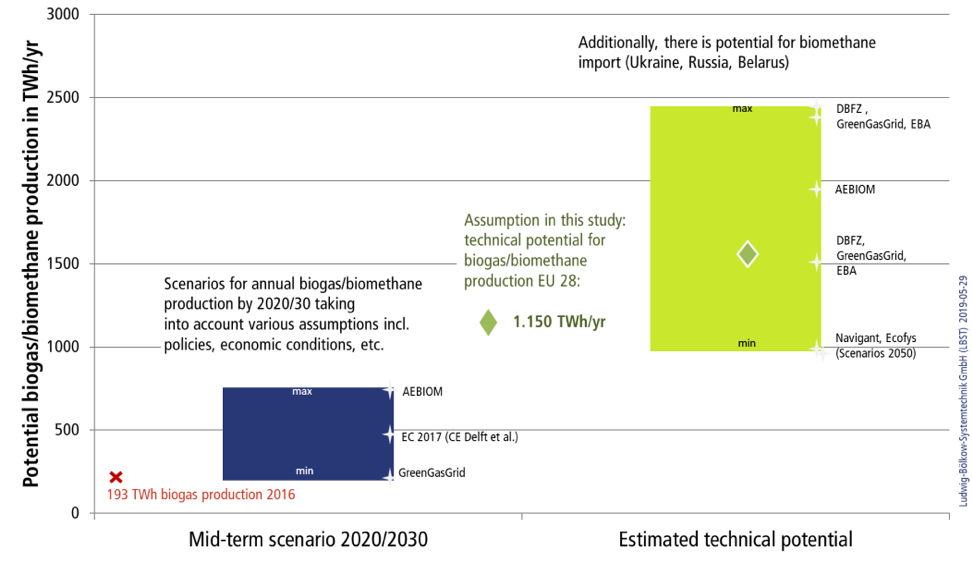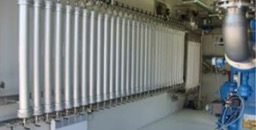Ihor Syzko: Why do we need biomethane?

The development of renewable gases in European countries is a result of the necessity to provide energy security (as the EU depends on exports by 80%), which formed the basis of the EU’s energy strategy until 2050. This position is declared in a number of documents, the main of which is the Green Deal. Scenarios for potential substitution of natural gas with biomethane/biohydrogen in the EU operate figures from 14% to 70%. Basic thing is that replacing natural gas with renewable gases is a must for future energy consumption. It will be recalled that biomethane is a perfect copy of natural gas in terms of its physical and chemical characteristics. The best thing, we could use the existing infrastructure (gas pipelines, GHG filling stations, burners, etc.) with the only difference being that it is produced from biomass at a biogas plant.
According to the Entsog report, the forecasts of European demand for biomethane imports will be 400 TWh / year (40 billion m3 / year) in 2035, and 1500 TWh / year (150 billion m3 / year) in 2050. Unlike green hydrogen, the supply of biomethane into the EU natural gas network has no technical or regulatory constraints in terms of specific volume to total gas volume (ie up to 100%), as evidenced by the conclusions of an extensive report on the Development of Green Gases (GHG) by the Energy Directorate for the European Commission. It means that biomethane can 100% replace natural gas without risks to gas networks and consumers. In addition, in the same report, Ukraine is one of the three potential key importers of biomethane to the EU.

Europe is 80% (404.5 billion m3 / year) dependent on natural gas imports (the keyword is “imports”) and is searching reliable sources (by the way, Russia supplies more than 150 billion m3 / year). If we have a biomethane production potential of 8 billion m3, it would be strange not to use this opportunity to provide at least half a percent. Infrastructure and interstate connections for gas exports from Ukraine to the EU have already been created. So, only the legislative regulation of biomethane in our legal field is missing.
The sooner we settle the status of renewable gases, the better it will be for all parties involved: local biomethane producers can find export contracts, farmers – contracts for animal and plant waste (substrates) supply, and state agencies do not have to invent the mechanism of the green tariff and support system of it.
Ihor Syzko
It should also be understood that abroad nobody does wait for Ukrainian regulations to pass committees, subcommittees, first and second readings. Other countries have been implementing real biomethane projects for about 10 years. Of course, over time, buyers of biomethane who are concerned about climate change should appear in Ukraine, but that’s another story.
The good news is that the idea of developing renewable gases is also supported by the national operator Naftogaz. Its recent development strategy aims to transport green gases through its gas transmission system to traders and end-users.


But before transporting, we need to choose a system for cleaning biogas to biomethane. Regarding production technologies, the following are common in industrial use in the EU: membrane cleaning, water and amine washing. All of them with their own features in the costs of CAPEX and OPEX. And depending on the availability of cheap resources at biomethane plants (water, electricity, etc.), the choice will fall on one or another biomethane upgrading system.
Biogest company has built and modernized more than 15 biomethane plants in the EU. Modernization means the reconstruction of an existing biogas plant for a biomethane plant in accordance with the local requirements of the gas specification of gas distribution networks. It should be noted that each EU country has its own requirements for the chemical characteristics of biomethane for supply to the network. So, the company has gained considerable experience in this sector.
BIOGEST is an international manufacturer and operator of biogas plants headquartered in Austria and has branches in the United Kingdom, France, the United States, Italy, Romania, Serbia, and the Czech Republic. To date, more than 160 projects of biogas plants producing electricity or biomethane have been completed.
Conclusion
Biomethane as a renewable energy source provides technological, environmental, and economic benefits. Energy can be produced 365/24/7. That is why biomethane has an important role in combining renewable energy from water, sun, and wind. In addition to helping to achieve climate protection goals, biomethane reduces dependence on imported energy. And decentralized energy generation also guarantees sustainable local development.


